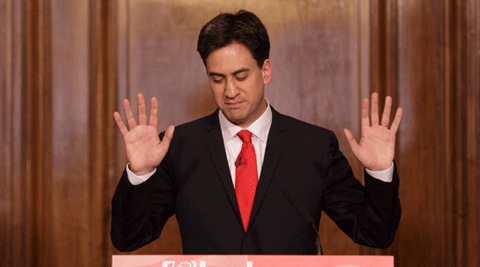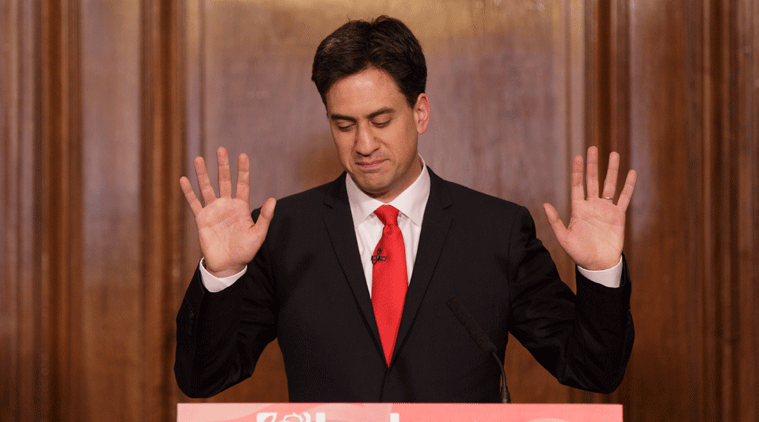Opinion Why Miliband lost
It wasn’t ideology. The Tories just ran a better campaign.

 Britain’s Labour Party leader Ed Miliband holds up his hands as he delivers his resignation at a press conference in Westminster, London. (Source: AP)
Britain’s Labour Party leader Ed Miliband holds up his hands as he delivers his resignation at a press conference in Westminster, London. (Source: AP)
Outside Britain, including in India, a lot of the discussion about the Conservatives’ surprise victory in the general elections has tended to assume that it represents a profound Indian-style lurch to the right. On one Indian TV channel, it was described as David Cameron’s “Thatcher moment”, implying that his win is as significant as Margaret Thatcher’s 1979 triumph, whose social and cultural impact still lingers. Parallels have also been drawn with Narendra Modi’s landslide win around this time last year.
But such assumptions flow from a flawed reading of the results and miss the changed nature of modern British politics. The fact is that the Tories remain unpopular, and are still widely viewed with suspicion as a club of posh boys out of touch with the lives of real people. As Matthew Parris, a former Tory MP and now award-winning The Times columnist, noted, the “Tory brand remains awful and one solid election victory does not change that”. He warned that “triumphant as we Tories may be feeling this weekend, I’m still sure the party is living on borrowed time… Don’t be fooled… They (voters) still don’t like us”.
So, there you are. And his is not an isolated view. Even Cameron knows that though he may have been able to persuade enough voters that it was safer to stick with him (the devil they knew) rather than putting their destiny in the hands of his untested and unconvincing rival, it does not mean that he or his party is loved more today than a week ago, when opinion polls showed them struggling. If elections were to be held again, say six months or a year later, the outcome may be quite different. That’s how fragile the Tories’ “solid’’ victory is.
There’s a simpler way of understanding what happened in the UK on May 7 than getting entangled in attempts to dignify it with an ideological rationale. For there’s no such thing as ideology in the British political lexicon anymore. It died with Thatcher, and Tony Blair’s New Labour firmly shut the lid on its coffin, designating the centre-ground as the main theatre of all future political battles. And that’s where national politics has stayed for close to two decades.
Theoretically, of course, there is still the notion of right and left (why, there’s even a British Communist Party) but in effect, the two have become two sides of the same coin. Cameron’s Tory party is, by and large, as ideology-lite as Blair’s New Labour was. It is not for nothing that Cameron is known as “Blair’s heir’’ — a modernising Tory come to bury the “nasty” Old Tory party in the same way that Blair got rid of the toxic Old Labour brand.
There have been attempts to portray Ed Miliband as “Red Ed’’ because he won the party leadership with the help of Labour trade unions, who saw in him a more pliable customer than his Blairite brother David. The truth, however, is that Ed is no tooth-and-claw communist brought in to topple the system. His entire campaign was built around nothing more revolutionary than the vague promise of raising the living standards of “hard working” families and reining in “irresponsible” capitalism.
There was nothing in the Labour manifesto that made it or him frighteningly leftish. His position on immigration, for instance, is as gung-ho as that of the Tories; like his former boss, Gordon Brown, he advocates the jingoistic principle of “British jobs for British boys first’’. On austerity too, his line is not hugely different from the Tories. He made clear that if he won the election, his government would not radically depart from the Tories’ austerity programme. But he would do it in a manner that caused less pain to ordinary people.
Does that sound like the programme of an ideologically driven left leader? The only seemingly hard left note in his campaign was what many saw as his “anti-business’’ agenda, in sharp contrast to Blair when, in the words of Peter Mandelson, the party was “intensely relaxed about people getting filthy rich’’. The Tories seized on Miliband’s criticism of certain business ethics to accuse him of opposing aspiration and enterprise — a message that did damage Labour prospects, but only to a limited extent.
The notion that it was an election fought along traditional left-right lines and that the left lost to the right is rubbish. If anything, the ideological overlap between the two parties was so evident that people constantly complained of a dearth of distinct choices. Contrary to the media narrative, the Miliband campaign was not distinguished by a radical shift to the left. Nor did Cameron spout hard right policies. Both ran on an essentially centrist platform with varying degrees of emphasis to target their core supporters.
So, what went wrong for Miliband? The short answer is, his personality. In an election where both main parties were short on policies, personalities came to a play a critical role. Ultimately, it boiled down to a choice between the smooth-talking, spit-and-polished “prime ministerial” Cameron and the “geeky”and socially awkward Miliband, whom voters struggled to visualise as prime minister.
Poll after poll showed that voters didn’t think he would make a good prime minister, while Cameron was the consistent favourite, even for those who didn’t agree with his policies. In the final hours, it came down not to a left-right choice, but whether to stick with a familiar arrangement in these uncertain times or be more adventurous. And Brits being Brits, cautious at the best of times, they chose to play it safe.
Of course, other factors also played their part, not least the fact that the Tories ran a more effective campaign. Their strategy of hammering on the Scottish National Party’s role in any Labour government succeeded in scaring enough English voters, including Labour supporters, to vote for status quo. They were also able to more effectively peddle their austerity message by blaming Labour for the 2008 economic crisis than Labour was able to sell its counter-narrative.
That about sums up the story of the 2015 British general elections and British politics. Ideology? What ideology?
Suroor is a London-based journalist





